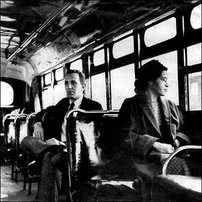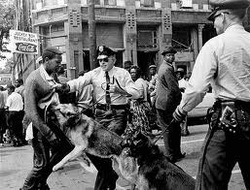|
Today's Driving Questions
Starter: Quiz on Dr. King's "Letter from Birmingham Jail" AGENDA 1. Review quiz answers 2. Ashley's PPT introduction of The Night Thoreau Spent in Jail 3. "Obama's War Rhetoric Throughout his Presidency"
4. Mexican-American War primary source articles Read the two primary source documents on the Mexican-American War and complete the Historical Thinking Skills chart. I'd recommend annotating these articles as well as you will use these in our final seminar on TNTSJ. You will have the rest of class today and depending on how much time you all need, up to 1st hour of class tomorrow.
**A few notes about strategies to best comprehending these readings:
HONORS HOMEWORK DUE TUESDAY, 9/6 Read Chapter 1 of Howard Zinn's A People's History of the United States: "Columbus, the Indians, and Human Progress"Answer the following questions in your digital comp books. 1. How does Zinn challenge your previous notions about the “discovery” of America by Christopher Columbus? How does this version complicate the dominant ideological tradition of Columbus as our forefather? 2. What is Zinn’s perspective about the writing of history? 3. Zinn argues that most history texts pretend that there is such a thing as “The United States”—a community of people with common interests. What are the “communities” that Zinn identifies? What “interests” do they share? What “interests” of one group might be in opposition to an “interest” of another group? 4. If communities share common interests, did Columbus and Las Casas belong to the same community? If so, what are their common interests? (What was Columbus in the Caribbean for? Las Casas?) If not, what interests separate them into different communities? Did Las Casas have more in common ideologically with the Arawaks than he did with Columbus? 5. From what you have read so far, how would you characterize Howard Zinn’s ideological bias?
0 Comments
Today’s Morality and Politics of Justice Driving Questions: What is Justice? What is the difference between a just and unjust law? How do security/liberty/equality play out in our legal system? Class Biz
Starter #3 Intro to Law and Justice Watch this short video explaining New York City's big gulp soda ban. Then choose 2 of the following 4 prompts. Write well-developed responses that show you're thinking about both sides of the issue but clearly defending your stance.
AGENDA 1. Four corners on starter prompts 2. Intro to Morality and Politics of Justice Essential Question #1: What is Justice? Today's Key Terms: JUSTICE (why are these definitions problematic?)
Food for thought: But why would someone protest laws? How do we determine which laws are protest-worthy? (review civil disobedience images-- what made these folks protest?) 3. Groups of 3-4 Discussion
4. SECURITY, LIBERTY, EQUALITY As a group decide which of these following 3 statements you most agree with and then come up with a law that proves each statement true (past or present law). Lastly, write your law on the board under the correct column.
5. Discussion:
6. Read Dr. Martin Luther King's "Letter From a Birmingham Jail"
Seminar Questions on Dr. King's Letter
Today's Goals:
1. Contemplate how past experiences influence one's perspective 2. Understand Ashley's class policies and expectations Starter # 2- Address the following prompts with regards to the statement in italics below (15 min) The Death Penalty is a morally justifiable practice in this country Do you agree or disagree with the above statement? What EVIDENCE supports your position? Which of your past experiences do you think have influenced your perspective on this issue? Class Biz 1. If you were absent yesterday, check my DP blog post. Always your responsibility to check my DP and make up any work you can before asking me. (Missed class + late work policy reminders) 2. Tomorrow's homework reminder 3. Thursday's Honors Lunch meeting reminder 4. Ashley's brief orientation of classroom layout 5. Bring tea! 6. Don't forget your shared resource-- please bring by the END of this week. See the syllabus for your contribution. Agenda 1. 4 Corners on the Starter 2. Reflection share-out and takeaways
3. Complete class charter (did anything come up during our 4 Corners that our charter seeks to or should address?) Yesterday we talked about what we value as a class. Today, we’ll make it a little more concrete.
4. Course Syllabus and Introduction to Ashley's Humanities 11 Course (Homework for tomorrow is to read this thoroughly and have your parents sign it!)
5. Ashley's DP Orientation
Today's Objectives:
Starter #1 Step 1: Instructions for creating a starter doc:
Step 2: Now, respond to these prompts:
Homework and CLASS BIZ
Today's Agenda 1. Share whatever part of your starter response, with which you feel comfortable, with a partner. 2. Review "The Function of Education" by Krishnamurti: (15 minutes)
3. Class discussion: 30 min.
Norms v. Values Distinction Norms: Socially-accepted codes of conduct set by a community/group/society Values: Beliefs an individual has to guide his/her behavior *Typically a value underlies a norm. For instance, if we implement the norm that everyone must raise their hand, we might value equal participation, calmness, structure. If we set a norm that we do appreciations at the end of each week, we must value appreciation and the expression of gratitude, etc.... 4. Class Values (40 min) This will ultimately end in a class constitution of sorts. What do we value in this class?
Welcome to Humanities 11!
Big Question: What is the function of education? Your own? For the human race? Introductions 1. Let's help the new Ospreys feel welcome!
2. Who am I, Ashley, your teacher? Questions for me? 3. A note on junior year: Best year of your life so far?
AGENDA What are we doing? Today, we are going to read a short chapter from a book entitled, Think on These Things by Krishnamurti about what the function (or role, or purpose) of education should be. Why? Because I want you all to begin calling into question assumptions we as a society often make about how the way things are, are the way things ought to be. Because I want you to begin to formulate your own personal philosophy on the role of education. Because I want you to respond to the ideas in this reading as a way to shape our own classroom culture. 1. On the front/back of the reading: In 1 sentence or less, what do you think the function of education in our society is? 2. Read as much of the reading as you can and as you do, highlight/underline/star at least 2 lines or passages that stand out to you. Your selections can be ideas you love, hate, or simply find interesting. 3. Spirit Read! Share one of the lines/passages you selected.
Homework: By the beginning of class (BOC) on Monday, please have finished today's reading if you did not get to during class. |
Archives
December 2017
CategoriesAshley CarruthHumanities 11 Teacher at Animas High School |




 RSS Feed
RSS Feed
